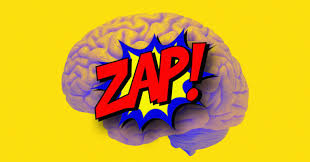These Brain Implants Could Electrocute People Out Of A Coma
Aadhya Khatri - Feb 14, 2020

OneZero suggests that we could use electrodes to send jolts directly into brain parts associated with consciousness to help these patients get out of a coma
- This Smart Bandage Will Heal Wounds That Can't Heal Without Requiring The Patient To See The Doctor
- Dentist Stripped Of License For Riding A Hoverboard While Operating On Patient
- The First “Co-Working” Hospital For Plastic Surgeons And Patients
Patients who have fallen into a coma have little chance of waking up if they have been in that state for a long time. OneZero, a recent study, suggests that we could use electrodes to send jolts directly into brain parts associated with consciousness to help these patients get out of a coma.

This study is the work of researchers from the University of Wisconsin-Madison and it has been published on Neuron, a biweekly peer-reviewed scientific journal. What the researchers did was to use a technique dubbed deep brain stimulation and then implant electrodes into macaque monkeys’ brains.
In this method, the experts aimed at a part called central lateral thalamus in the brain of anesthetized monkeys. In tests, the treated monkeys opened their eyes, moved their limbs, bodies, and faces. Their vitals also changed after being zapped.
This is surely a good sign but do not put your hopes up just yet. When the scientists stop stimulating, the monkeys fell back into the coma again, and the point here is to help the subjects regain their consciousness, not to wake them up temporarily.
We may have to wait for a few more years until the day when using electrodes can zap people out of comas.
The first thing the researchers have to do is to test if the monkeys could perform complex activities when they are temporarily awake or not. Next, when the method can actually wake animals up for good, the experts need to perform a lot more tests before the treatment can be cleared to be used on a human patient.
>>> Dentist Stripped Of License For Riding A Hoverboard While Operating On Patient
Featured Stories

Features - Jan 29, 2026
Permanently Deleting Your Instagram Account: A Complete Step-by-Step Tutorial

Features - Jul 01, 2025
What Are The Fastest Passenger Vehicles Ever Created?

Features - Jun 25, 2025
Japan Hydrogen Breakthrough: Scientists Crack the Clean Energy Code with...

ICT News - Jun 25, 2025
AI Intimidation Tactics: CEOs Turn Flawed Technology Into Employee Fear Machine

Review - Jun 25, 2025
Windows 11 Problems: Is Microsoft's "Best" OS Actually Getting Worse?

Features - Jun 22, 2025
Telegram Founder Pavel Durov Plans to Split $14 Billion Fortune Among 106 Children

ICT News - Jun 22, 2025
Neuralink Telepathy Chip Enables Quadriplegic Rob Greiner to Control Games with...

Features - Jun 21, 2025
This Over $100 Bottle Has Nothing But Fresh Air Inside

Features - Jun 18, 2025
Best Mobile VPN Apps for Gaming 2025: Complete Guide

Features - Jun 18, 2025
A Math Formula Tells Us How Long Everything Will Live
Read more

Mobile- Feb 16, 2026
Xiaomi Launches Affordable Tracker to Compete with Apple's AirTag
For users tired of ecosystem lock-in or high prices, the Xiaomi Tag represents a compelling, no-frills option that delivers core functionality at a fraction of the cost.

Mobile- Feb 17, 2026
Anticipating the Samsung Galaxy S26 and S26+: Key Rumors and Specs
The Samsung Galaxy S26 series is on the horizon, sparking excitement among tech enthusiasts.

ICT News- Feb 18, 2026
Google's Project Toscana: Elevating Pixel Face Unlock to Rival Apple's Face ID
As the smartphone landscape evolves, Google's push toward superior face unlock technology underscores its ambition to close the gap with Apple in user security and convenience.
Comments
Sort by Newest | Popular